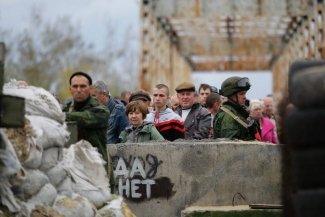New hopes, old risks: the prospects for settling the conflict in Donbas

A working meeting was held on 2 September in Berlin as part of preparations so-called Normandy Format summit (leaders of Ukraine, Russia, Germany and France) for settling the conflict in Donbas. This will be the first such summit since 2016. When the meeting was over, the Ukrainian minister of foreign affairs, Vadym Prystayko, announced that Ukraine intended to end the war by the end of this year and that “we will have to make some painful compromises”, which – as he stated – was an effect of the decisions which had already been made, starting from 2014.
Since Volodymyr Zelensky took power, he has caused a significant intensification of international negotiations concerning Donbas because ending the war is one of his key goals. During his election campaign and after taking the office he promised on numerous occasions that he would make efforts to resolve the conflict as soon as possible. He also emphasised that Ukraine cannot afford the present situation in the east of the country to continue for years. Public opinion polls (including the Rating conducted in June this year) indicated that 65% of Ukrainians expect the president to bring peace back to Donbas. This is seen as more important than improving the economic situation (39%) and combating corruption (33%).
The new Ukrainian government decided to resume formal and informal consultations with Russia on settling the conflict. Immediately after his inauguration, Zelensky appointed Andriy Yermak, a legal expert and film producer, as his advisor for Donbas. Mr Yermak is tasked with maintaining working contacts with the Kremlin. Mr Zelensky has also announced that Ukraine has developed a ‘road map’ to end the war. No details have been revealed. However, Zelensky emphasises that the Minsk agreements remain the basis for resolving the conflict. Meetings as part of the Normandy format on the level of advisors were reactivated after a break which had lasted for many months (the first meeting was held on 12 July in Paris). Zelensky and Putin also had two first telephone conversations.
Commentary
- Over the past three months, the Ukrainian diplomacy has significantly activated contacts with Germany and France, the key countries in Kyiv’s European policy. The new president went on his first foreign visits to Brussels, Paris and Berlin. This choice was dictated by the desire to ensure political support for unfreezing the negotiations as part of the ‘Normandy four’ and Zelensky’s hope that, with Western help, he would manage to lead to a compromise with Russia. Meanwhile, the Ukrainian president also had four telephone conversations with Chancellor Angela Merkel and three with President Emmanuel Macron. In addition to this, several meetings of representatives of Ukraine and the US administration were held (for example, Zelensky met with US Vice President Mike Pence in Warsaw and with the National Security Advisor, John Bolton in Kyiv).
- Kyiv’s increasing activity linked to the peace process in Donbas has been accompanied by appeals in the West to revise the EU’s policy on Russia, including to gradually lift sanctions. Macron’s speech of 27 August, in which he claimed that “pushing Russia away from Europe is a profound strategic mistake” and that the EU has to make a new strategic offer to it, has been the most widely commented on. Given the present political climate in Western Europe, President Zelensky may expect support in his efforts to settle the conflict in eastern Ukraine. Furthermore, the leading EU member states will even push the government in Kyiv to reach a compromise with Moscow because the war in Donbas is viewed as the main problem preventing the normalisation of relations between the EU and the Russian Federation.
- Kyiv’s moves on the international arena and the visible softening of the new government’s rhetoric with regard to Russia prove that Zelensky wants the situation in Donbas to be resolved as soon as possible. It can be concluded from what people from his inner circle are saying that Ukraine would be ready to make certain concessions provided that these result directly from the Minsk agreements (numerous provisions of this document are unfavourable for Kyiv). The Kremlin is aware of the fact that Zelensky is under pressure due to the promises which he himself has made. It therefore hopes that it will be able to dictate the conditions of peace in Donbas to Kyiv. For Russia it is vital that this region is guaranteed a special and unalterable status as part of the Ukrainian state in the Ukrainian constitution. Donbas’s autonomy would be part of the process of the decentralisation of the Ukrainian state. This would be accompanied by the legitimisation of the Moscow-controlled separatists by holding elections in this region under international supervision (the so-called ‘Steinmeier plan’). In essence, this would mean that Moscow would in fact maintain control of Donbas and would thus be able to influence Ukraine’s policy. At the same time, Russia is interested in making progress in resolving the conflict, provided that this is done on its terms, because this would result in lifting or at least significantly ameliorating the Western sanctions which are adversely affecting its economy. Another important fact is that the proposed peace process would not concern Crimea whose status, according to Moscow, is non-negotiable. There has also been a visible change over the past few weeks in the propaganda message from the Russian-controlled so-called Donetsk and Luhansk People’s Republics. There is now an emphasis that unification with Ukraine is the future of both self-proclaimed ‘republics’.
- If the Ukrainian government agrees to make concessions to Russia, this could be an extremely risky move. It may be expected that a deal that will harm Ukraine’s interests will not be accepted by part of the public. This could lead to a serious political crisis and the destabilisation of the situation inside the country, which could even mean a beginning of the end of Zelensky’s rule. It cannot be ruled out that Kyiv will hold a referendum to gain public approval of the terms of the compromise with Russia. However, this would require amending the Ukrainian legislation since there are no legal acts that would regulate holding national referendums in Ukraine (the referendum act of 2012 was deemed contrary to the constitution by the Constitutional Court last year).
- It is possible that a meeting of the Normandy format leaders will even be held in the coming weeks, which will mean that an outline of the deal has been agreed during the working meetings. It cannot be ruled out that before the deal is struck, Ukraine and Russia will exchange prisoners of war as preparations for this have been underway for a few weeks now. This, on the one hand, would be intended to strengthen Zelensky’s position at home and present him as an effective leader, and on the other to manifest to the West Russia’s good will to find a solution to the conflict in Donbas.




